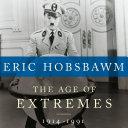Source: The Age of Revolution (1962), Chapter 15, Science
Works

The Age of Extremes
Eric HobsbawmFamous Eric Hobsbawm Quotes
Preface to Pantheon Edition
Bandits (1969)
The Guardian http://www.guardian.co.uk/commentisfree/2009/apr/10/financial-crisis-capitalism-socialism-alternatives (2009).
“Human beings are not efficiently designed for a capitalist system of production.”
Source: The Age of Extremes (1992), p. 414.
Source: How to Change the World: Reflections on Marx and Marxism
Eric Hobsbawm Quotes about the world
As quoted by Eric Hobsbawn, in “A Question of Faith,” Maya Jaggi, The Guardian (Sept. 14, 2002)
The Age of Extremes (1992)
Source: The Age of Extremes (1992), p. 36 <Ref> https://libcom.org/files/Eric%20Hobsbawm%20-%20Age%20Of%20Extremes%20-%201914-1991.pdf</ref>
Source: Nations and nationalism since 1780 programme, myth, reality (1992), p. 133.
Chap. 17 : The Curious History of Europe
On History (1997)
Eric Hobsbawm Quotes
Source: Bandits (1969), Chapter Two
Context: Banditry is freedom, but in a peasant society few can be free. most are shackled by double chains of lordship and labour, one reinforcing the other. For what makes peasants the victim of authority is not as much their economic vulnerability - indeed they are as often as not virtually self sufficient - as their mobility.
Source: The Age of Extremes (1992), Chapter Sixteen, End of Socialism
Source: The Age of Extremes (1992), Chapter Eleven, Cultural Revolution, p.338-339
Context: The old moral vocabulary of rights and duties, mutual obligations, sin and virtue, sacrifice, conscience, rewards, and penalties, could no longer be translated into the new language of desired gratification. Once such practices and institutions were no longer accepted as part of a way of ordering society that linked people to each other and ensured social cooperation and reproduction, most of their capacity to structure human social life vanished. They were reduced simply expressions of individuals' preferences, and claims that the law should recognize the supremacy of these preferences. Uncertainty and unpredictability impended. Compass needles no longer had a North, maps became useless.
Introduction
The Age of Extremes (1992)
Context: My object is to understand ad explain why things turned out the way they did, and how they hang together. For anyone of my age-group who has lived through all or most of the Short Twentieth Century this is inevitably also a autobiographical endeavor. We are talking about, amplifying (and correcting) our own memories. And we are talking as men and women of a particular time and place, involved, in various ways, in its history as actors in its dramas - however insignificant our parts - as observers of our times and, not least, as people whose views of the century have been formed by what we have come to see as its crucial events.
“Words are witnesses which often speak louder than documents.”
Introduction
The Age of Revolution (1962)
Context: Words are witnesses which often speak louder than documents. Let us consider a few English words, which were invented or gained their modern meanings, substantially in the period of sixty years with which this volume deals. They are such words as 'industry', 'industrialist', 'factory,' middle class,' 'working class,' and 'socialism.' They include 'aristocracy,' as well as 'railway,' 'liberal' and 'conservative' as political terms, 'nationality,'scientist,' and 'engineer,' 'proletariat,' and (economic) 'crisis'.
Source: The Age of Extremes (1992), Chapter Six, The Arts 1914-1945
How To Change the World: Reflections on Marx and Marxism (2011)
The Arts 1914-1945
The Age of Extremes (1992)
Mapping the Nation (Mappings Series) http://books.google.co.in/books?id=39IHUaOV9fUC&pg=PA263 (13 November 2012), p. 263.
Source: The Age of Revolution (1962), Chapter 12, Ideology: Religion
Source: Bandits (1969), Chapter One, What is Social Banditry
Source: The Age of Revolution (1962), Chapter 6, Revolutions
The Arts 1914-1945
The Age of Extremes (1992)
How To Change the World: Reflections on Marx and Marxism (2011)
“The paradox of communism in power was that it was conservative.”
Source: The Age of Extremes (1992), p. 422.
Bandits (Penguin, 1985), p. 25.
Source: Nations and nationalism since 1780 programme, myth, reality (1992), pp. 76–77.
Source: The Age of Revolution (1962), Chapter 13, Ideology: Secular
Source: The Age of Revolution (1962), Chapter 16, Conclusion: Towards 1848
Source: The Age of Extremes (1992), Chapter Eleven, Cultural Revolution, p.320
Source: The Age of Revolution (1962), Chapter 10, A Career Open to Talent
Introduction, The Century: A Bird's Eye View
The Age of Extremes (1992)
The Arts 1914-1945
The Age of Extremes (1992)
“In terms of political geography, The French Revolution ended the European Middle Ages.”
Source: The Age of Revolution (1962), Chapter 4, War
Source: The Age of Extremes (1992), Chapter Eleven, Cultural Revolution, p. 335
Source: The Age of Extremes (1992), Chapter Sixteen, End of Socialism
“Xenophobia looks like becoming the mass ideology of the 20th-century fin-de-siecle.”
Divided Europeans: Understanding Ethnicities in Conflict http://books.google.co.in/books?id=4aECmbMMzIYC&pg=PA41 (1999), p. 41.
Source: The Age of Revolution (1962), Chapter 4, War
Nations and Nationalism since 1780: Programme, Myth, Reality http://books.google.com/books?id=OHz70fY8t2UC&lpg=PA12&pg=PA12#v=onepage&q&f=false (Cambridge University Press, 2nd ed. 2012), p. 12.
Nations and nationalism since 1780 programme, myth, reality (1992)
Primitive Rebels: Studies in Archaic Forms of Social Movement in the 19th and 20th Centuries http://books.google.com/books?id=sCK8AAAAIAAJ&lpg=PP1&pg=PA60#v=onepage&q=&f=false (1971), p. 60.
Chap. 9 : Partisanship
On History (1997)
Chap. 3 : What Can History Tell Us about Contemporary Society?
On History (1997)
Chap. 2 : The Sense of the Past
On History (1997)
